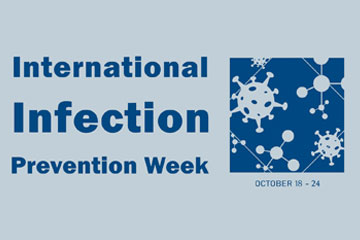International Infection Prevention Week (IIPW) is celebrated the third week of October every year. This year IIPW is October 18-24. The Association for Professionals in Infection Control and Epidemiology (APIC) which spearheads this annual observance states that it wants this year to be a celebration of the bravery and tireless efforts of the world’s infection preventionists (IPs). COVID-19 has highlighted how important IPs are to global health, safety and well-being.
Infections are caused by pathogens such as bacteria, viruses, or other microorganisms that can cause diseases. Many organisms live inside and on our bodies. Usually they are harmless and even helpful, but under certain conditions, some organisms cause diseases. Infectious diseases are spread when these microorganisms are transferred from person to person. They can spread through contaminated water or food, indirect contact for instance, touching a door handle that is touched by a person having flu or cold, and even transmitted by insects or other animals. They enter the body and interfere with normal functions and are the leading cause of illness.
Symptoms vary according to the infection type. Some general symptoms that shows when a person is infected:
- Fever or chills
- Coughing or sneezing
- Body pain
- Feeling fatigued
- Nausea, upset stomach, vomiting
If the symptoms get worse, consider consulting a doctor. Mild infections may be cured with rest and home remedies, while some life-threatening infections need hospitalization.
Personal hygiene plays a key role in infection prevention as they avoid the transmission of harmful germs. The spread of infections can be controlled by following simple strategies:
- Wash your hands frequently and well, after using the bathroom, feeding or stroking your pet, visiting or taking care of a sick person, sneezing, coughing, before eating or preparing food, and after any other tasks that make you dirty.
- Avoid close contact with sick people and stay away from others when you are sick.
- Cover your mouth and nose when coughing or sneezing, these help people around from getting sick and avoid flu, and other respiratory illnesses, such as whooping cough, COVID-19, etc.
- Get vaccinated – this can protect you from serious and preventable diseases like the flu, pertussis, and many others. It can reduce the risk of severe bacterial infections, persistent and painful viruses, and even cancer.
- When you are traveling, be aware of the infections common to the area where you are staying and take care, some of them have even vaccines available.
- Consult doctor if you have any animal bites.
- Avoid sharing personal items such as toothbrushes, drinking glass, razor blades, etc.
- Before cooking or serving wash all meat, poultry, fish, vegetables, and fruits. Cook foods to the proper temperature. Don’t keep the cooked foods at room temperature for a long time.
- Cover cuts or scrapes to prevent them from becoming infected.
This year, due to COVID-19, following these instructions and maintaining social distance is more crucial than before.
